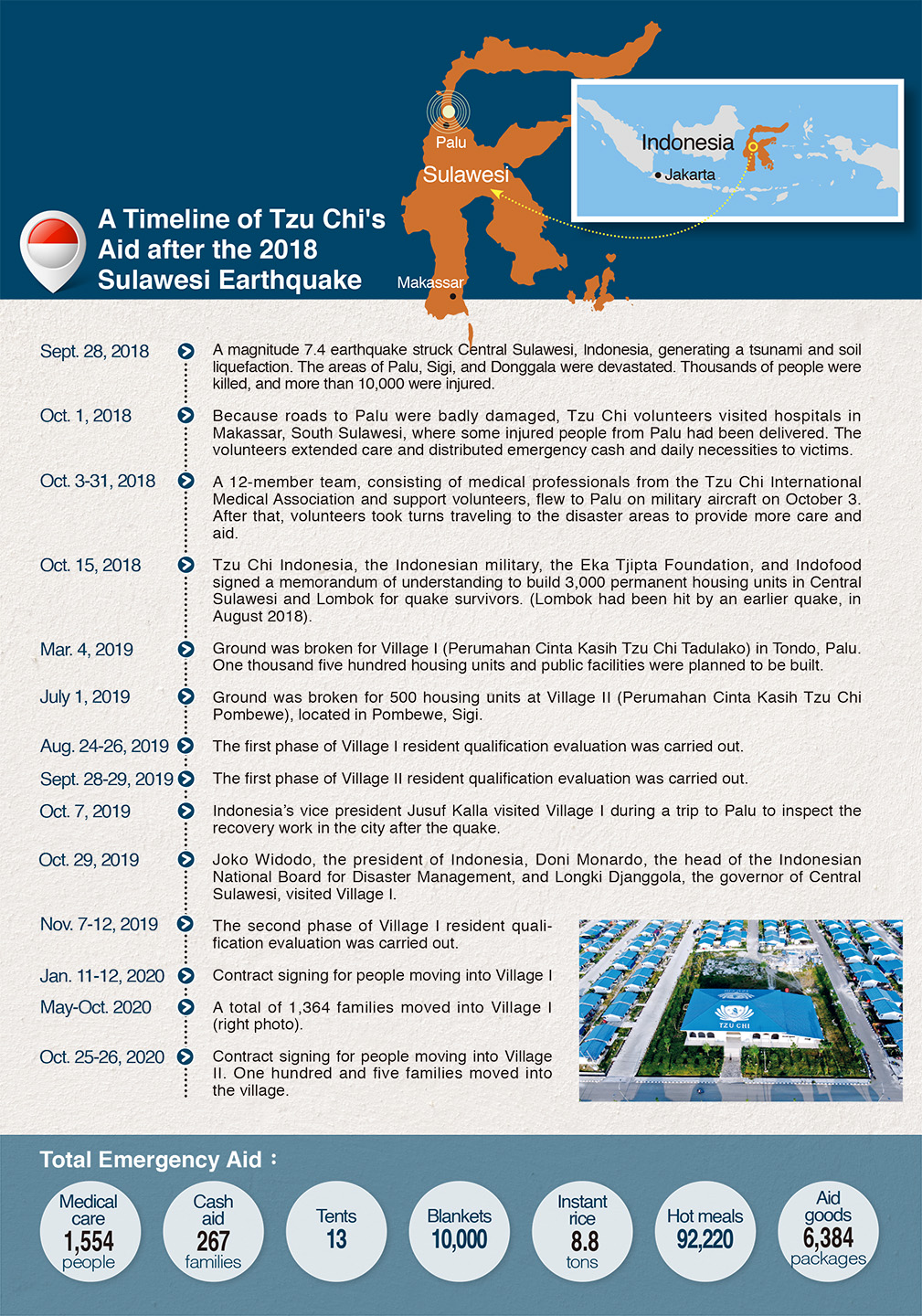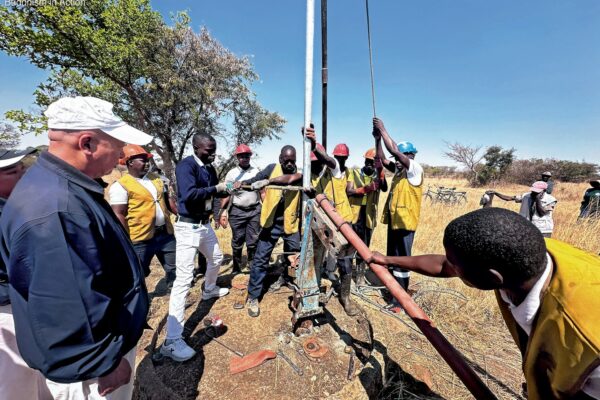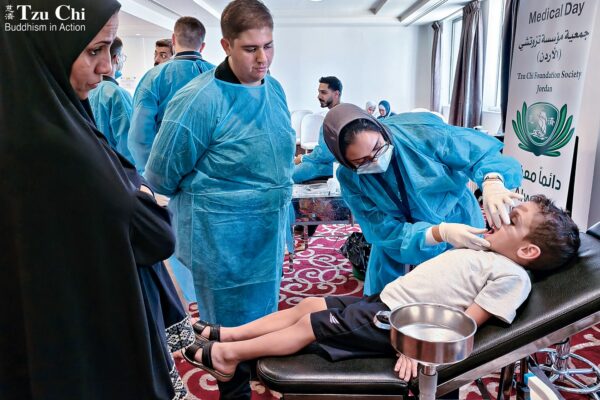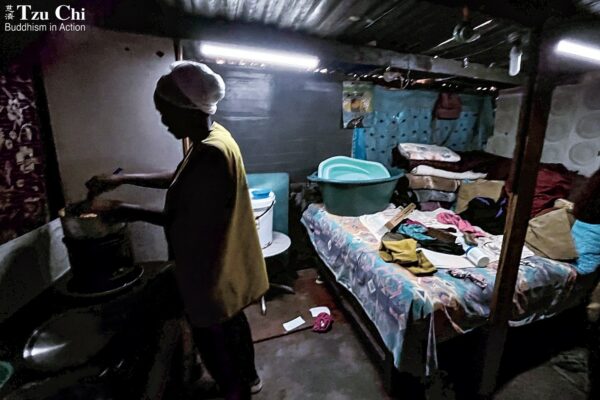Compiled by Huang Xiao-qian
Translated by Wu Hsiao-ting
Photos by Anand Yahya
In 2018, an earthquake resulted in soil liquefaction and a tsunami in Central Sulawesi, Indonesia. Over 4,000 people perished, and many more were left homeless. Two years later, victims moved into new homes to start their lives anew.
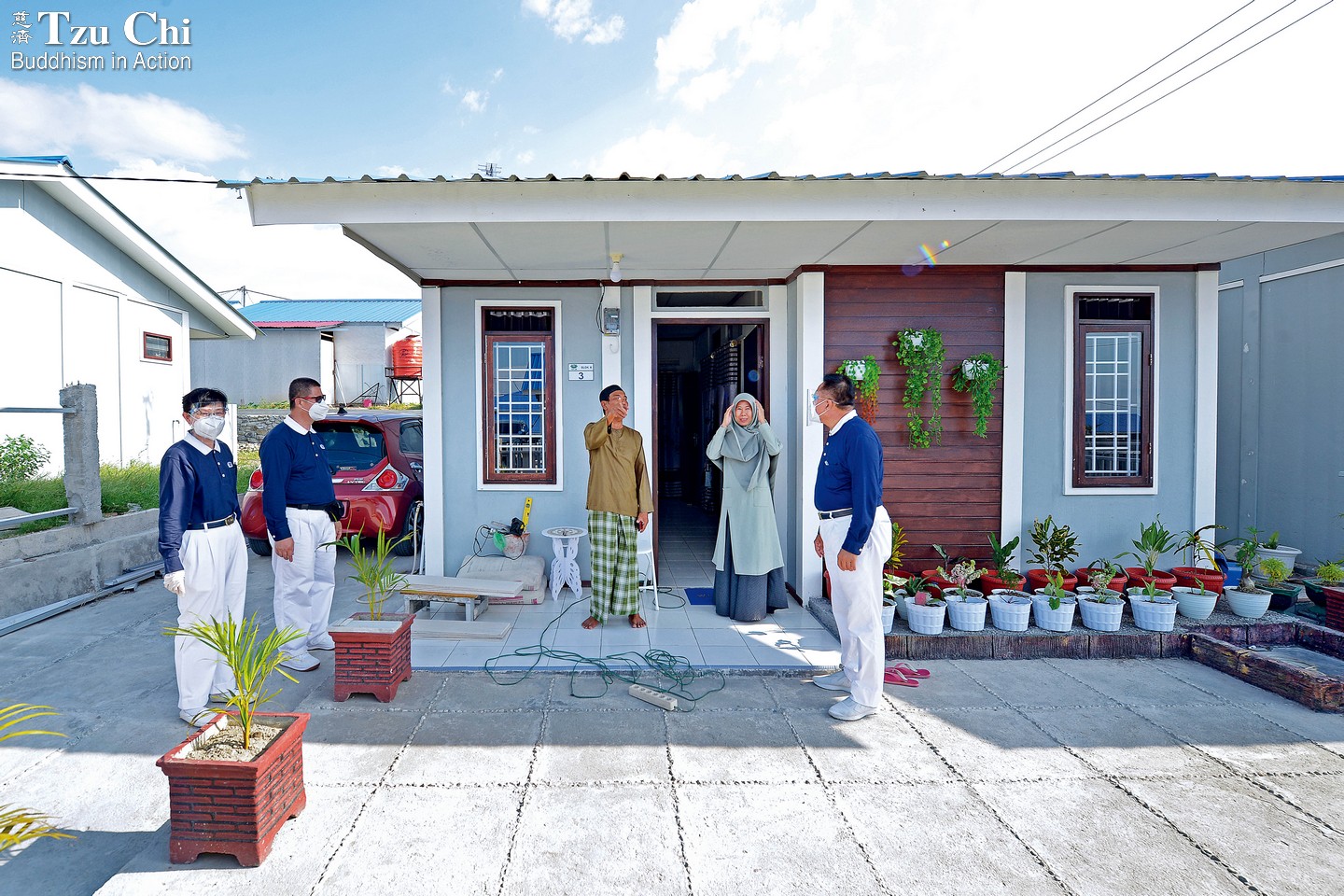
Tzu Chi volunteers visit a housing village in late October 2020. The village, which can accommodate 1,500 families, was built for displaced quake survivors in Palu, Indonesia. Tzu Chi started handing over the homes there to survivors in May 2020.
In September 2018, a magnitude 7.4 earthquake rocked Central Sulawesi in Indonesia. The massive earthquake resulted in ground liquefaction, landslides, and a tsunami. More than 4,000 people lost their lives, and many more lost their homes.
In response to the disaster, three organizations stepped in to help survivors find their footing again. Tzu Chi Indonesia, the Eka Tjipta Foundation, and Indofood, an Indonesian food company, banded together to build two housing communities for survivors. Village I included 1,500 homes. It was built in Palu, the capital of the province of Central Sulawesi. Village II, located in Sigi, comprised 500 housing units.
In October 2020, a group of Tzu Chi volunteers arrived to look around Village I in Palu. They had just finished the third phase of a qualification evaluation for people moving into the village, though by that time most residents had already moved into their new homes. The handover of the housing units had begun several months earlier, on May 18.
During their tour, the volunteers stopped at a home fronted with a wonderful display of plants. The greenery made the home look very appealing. The homeowner, Dr. Hasan, warmly greeted the group of visitors. “Come in and have a seat,” he invited. “When did you arrive in Palu?”
“We’ve been here for two days,” volunteer Zhuang Ying-he (莊英荷) responded. “We’re here this time to conduct the third phase of the resident qualification evaluation. How do you like your new home? Are you happy with it?”
“Thank our good lord, Allah! Of course I’m happy!” Hasan exclaimed. “This is a gift from many people. I’m grateful for it and will definitely take good care of it.” He said that it was still a little hot during the day because the trees he had planted at his new home hadn’t grown tall yet, but other than that, everything was good.
Hasan and his family had lived in temporary housing provided by the government before moving into the village in August 2020. Tzu Chi had provided beds, a dining table, and a set of toiletries for each home. The Palu city government had laid interlocking paving bricks on the roads in the village and set up power lines. Running water was being installed. Hasan was happy. “This is more than ‘adequate’ for us,” he said.
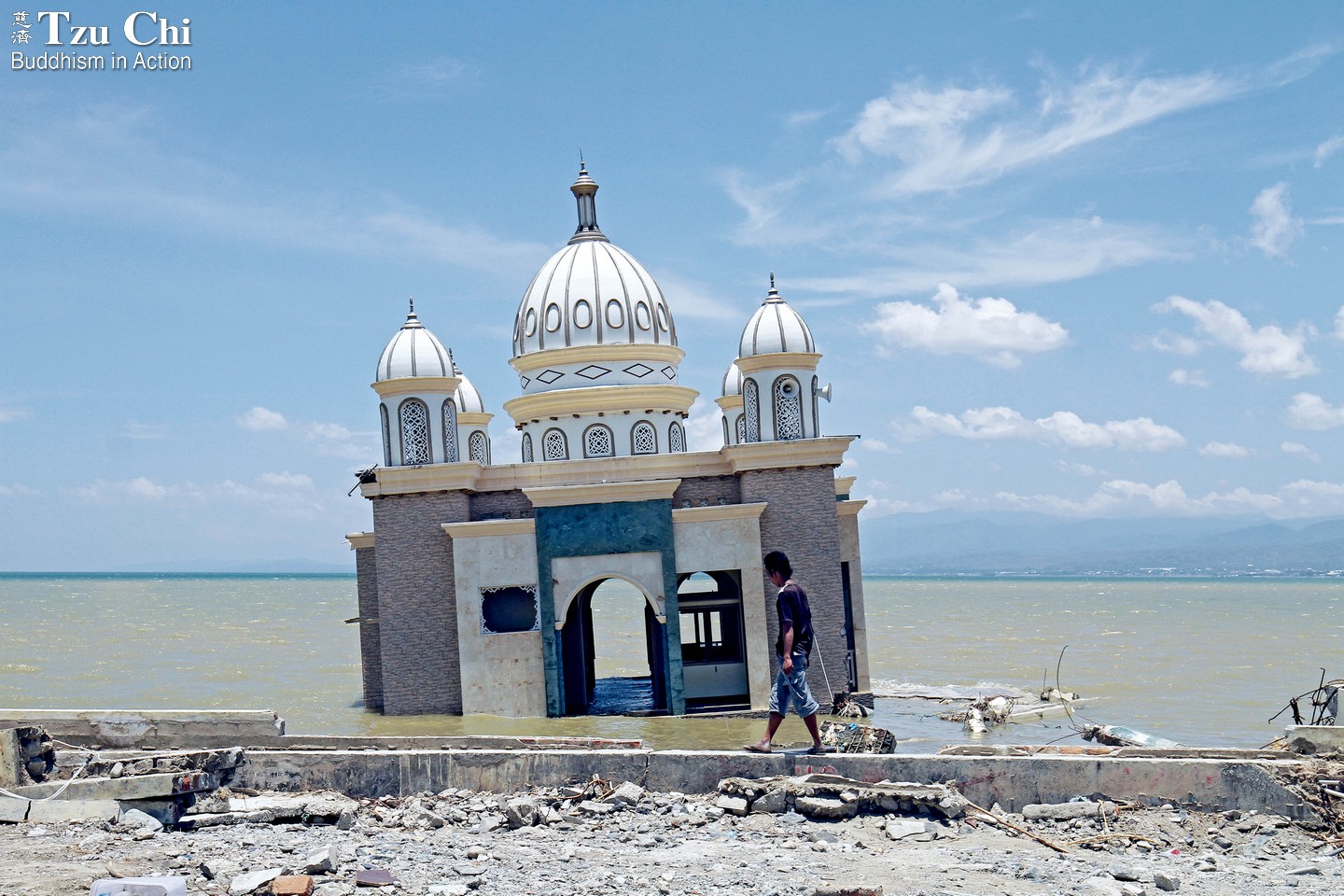
The 2018 earthquake set off a tsunami and landslides. This seaside mosque was hit by the tsunami. Arimami Suryo Asmoro
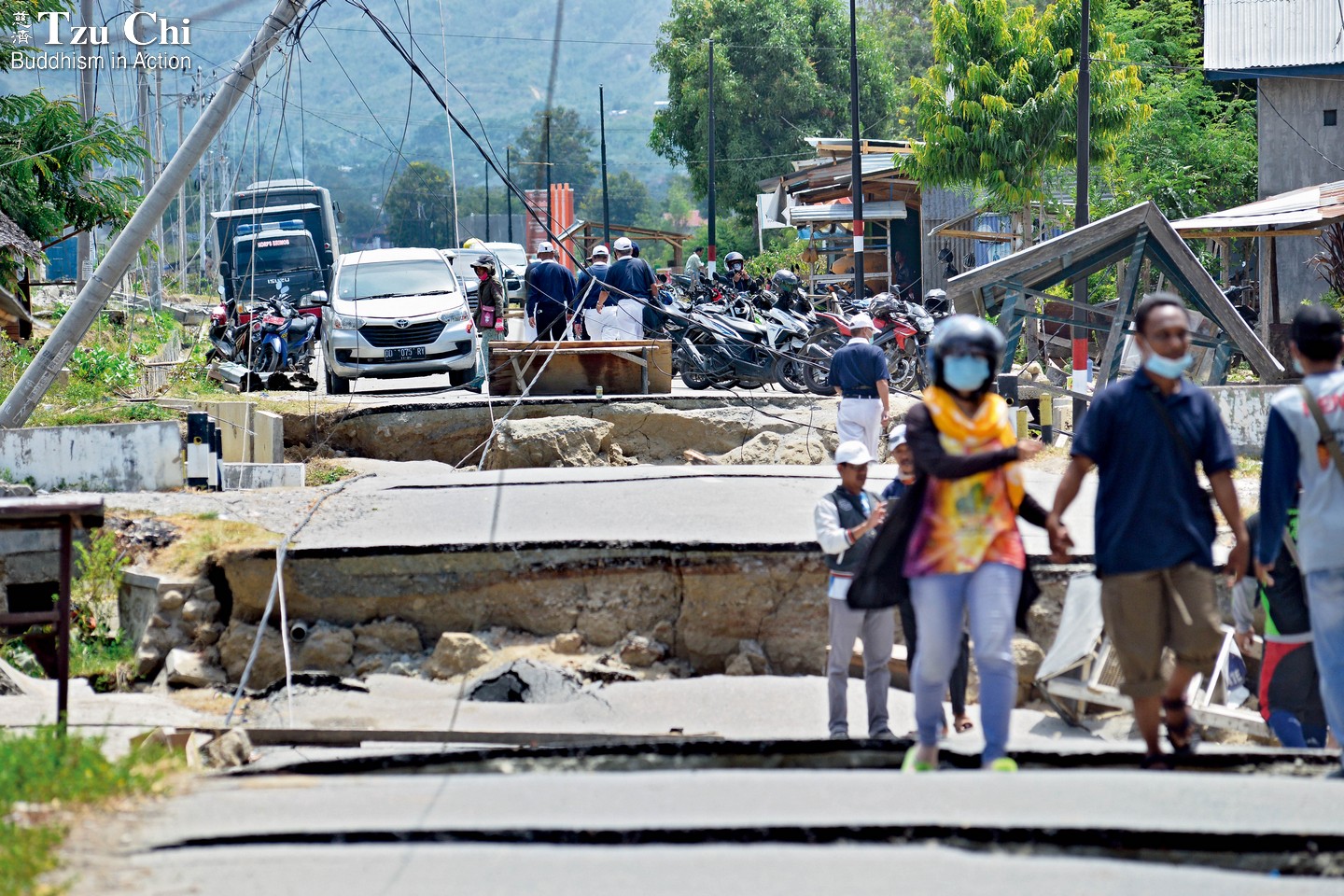
The strong earthquake triggered soil liquefaction, which devastated the village of Petobo. Roads and buildings were badly damaged or destroyed.
Back on their feet
Nyoman Sutrisno, another resident, was born on the Indonesian island of Bali before moving to Palu in 2002. He bought a house in the village of Petobo in 2009, where he lived with his family until the devastating earthquake struck in 2018. Unlike many homes that had collapsed during the disaster, Sutrisno’s house still stood where it had been built—but that was all that could be said for it. It had been buried under heaps of soil, the roof warped and misshapen under the weight. Since the area where the house stood had been designated as a danger zone, reconstruction there was forbidden by the government.
Sutrisno recalled that he and his son were taking a shower when the temblor hit. They immediately wrapped themselves in towels and dashed out of their home, along with Sutrisno’s wife and mother. “Our home sat right on a street corner. Once we were outside, I saw our neighbors’ homes and cars moving in front of me.” He was witnessing a phenomenon called “soil liquefaction,” during which the solid ground loses its stiffness and strength as an earthquake shakes, giving it the properties of a liquid.
Sutrisno and his family took temporary shelter after the quake at a nearby mosque, where a neighbor gave him a pair of pants to wear. Later, they moved into a provisional housing unit provided by the government, but it wasn’t very satisfactory. They had no running water or bathroom, nor were they close to a school. When the rainy season arrived, they even had to contend with flooding.
After they had lived there for a while, Sutrisno’s wife wanted to restart her tailoring business, so the family moved in with her father. Sutrisno, a police officer, returned to his job soon after the disaster. With his wife working again, the family was soon able to get back on their feet, and they began looking to move into a home of their own.
A local disaster relief agency offered three permanent housing locations from which Sutrisno could choose. He picked the village where he currently resides because it was near Tadulako University, and he had his son’s education in mind. After passing the screening by the agency and Tzu Chi, the family moved into the village in August 2020. The village was well planned with landscaping, conference facilities, and soon-to-be-open schools. (A kindergarten and elementary school were under construction when Sutrisno and his family moved in.) Though the village was not one hundred percent completed, Sutrisno was very grateful that he could become a resident there.
“Thanks to Tzu Chi, we now have an ideal place to live and can embark on a new life,” he said. “The Great Love spirit of the foundation, which transcends race and religion, moves me to no end. It has also inspired me to do my best to help others.” The police officer added that he had noticed that residents of the Tzu Chi village were happy to help and encourage each other. “It’s probably because we’ve been through the same disaster,” he mused.
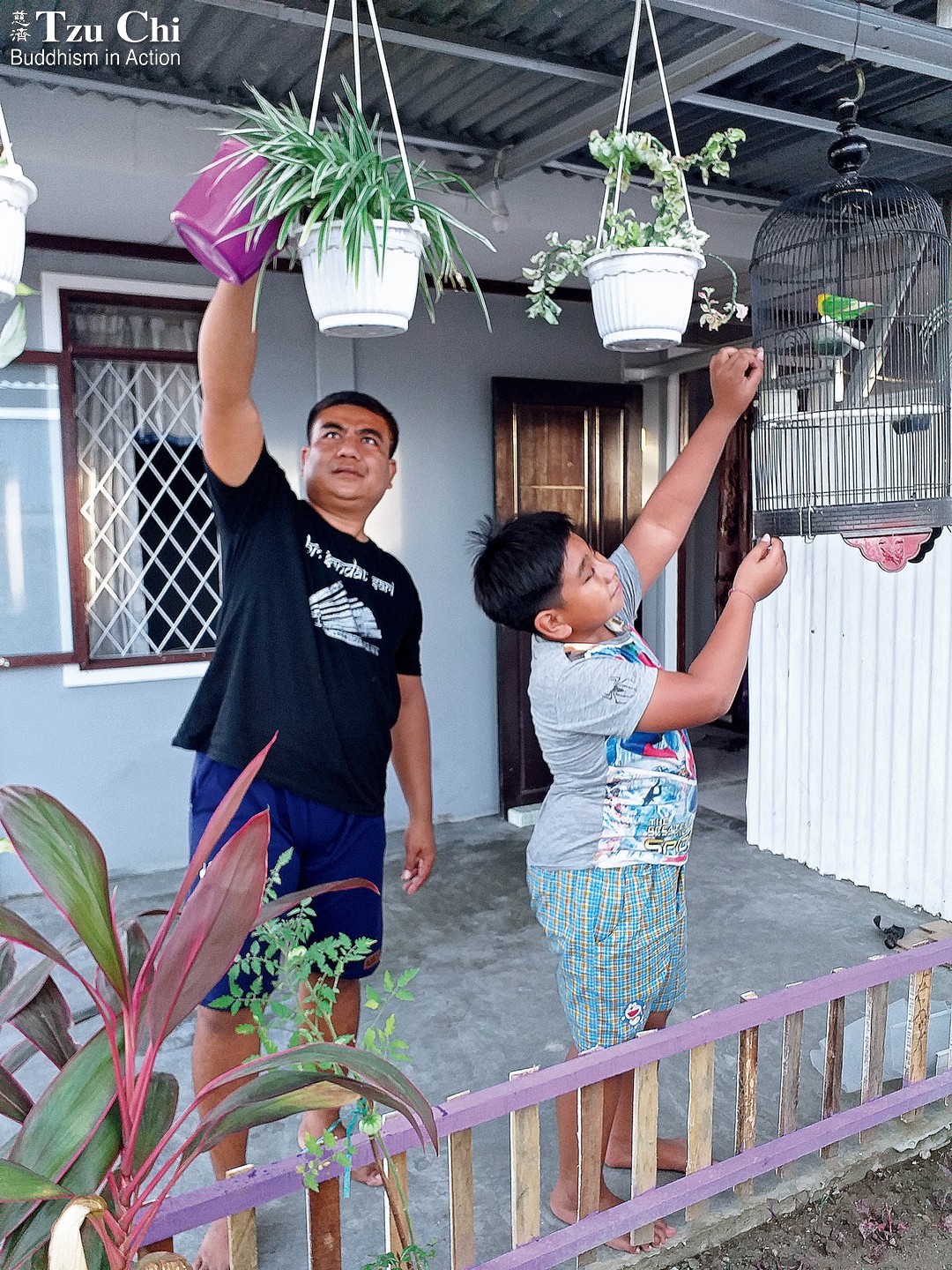
Police officer Nyoman Sutrisno, his son to his right, tends to potted plants at his home in the Tzu Chi village. He promised he would take good care of his house.
From being helped to helping others
Like many other survivors, Suudia Ramlia lost family members and her home in the disaster. When the quake struck, her home moved 800 meters (0.5 mile) before collapsing. Both her husband and younger child were killed. She and her other child, on their way to attend a seaside carnival, survived because they were not home at the time.
Ramlia’s spirit plummeted to the depths after her beloved husband and daughter were killed. It took her a long time to pull herself together. Two years had passed since the earthquake, and she had become much stronger. She now runs a bakery, named Zaza Cake and Cookies, in the Tzu Chi village. Learning from her late husband, who liked to help others, she provides job opportunities in her bakery for people living nearby. She treats her seven employees as if they were her own family. “The soil liquefaction disaster changed me,” she said. “It prompted me to use my own way to benefit others.”
“Tzu Chi helped build such a good place to live,” she added. “We have all the facilities we need in the community, and the landscaping is beautiful. We’re very thankful.” Ramlia commended Tzu Chi for helping people without regard to race or religion. Out of gratitude and wanting to serve others, she assisted in several Tzu Chi events before moving into the village. “Though everyone is different, our goal is the same: to help people become better.”
After witnessing how Tzu Chi volunteers had helped people in Palu, Ramlia became even more convinced that people should love and help each other. “Our deepest gratitude goes to Tzu Chi for coming to Palu and easing our burden. Every Tzu Chi volunteer is kind and friendly. May God bless you all.”
